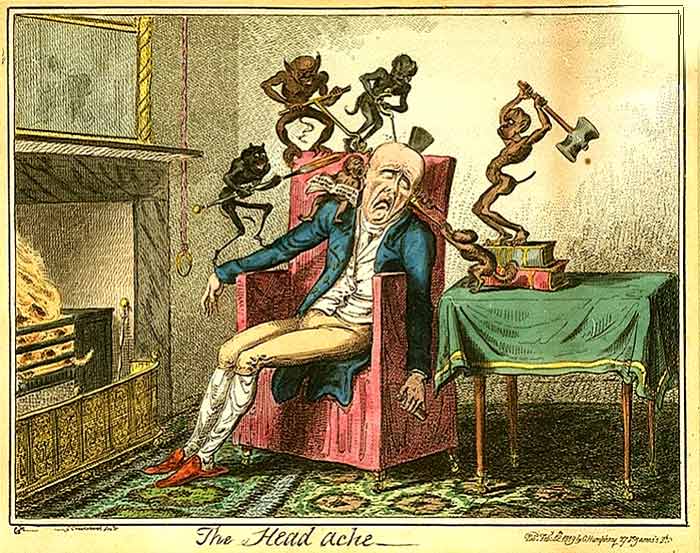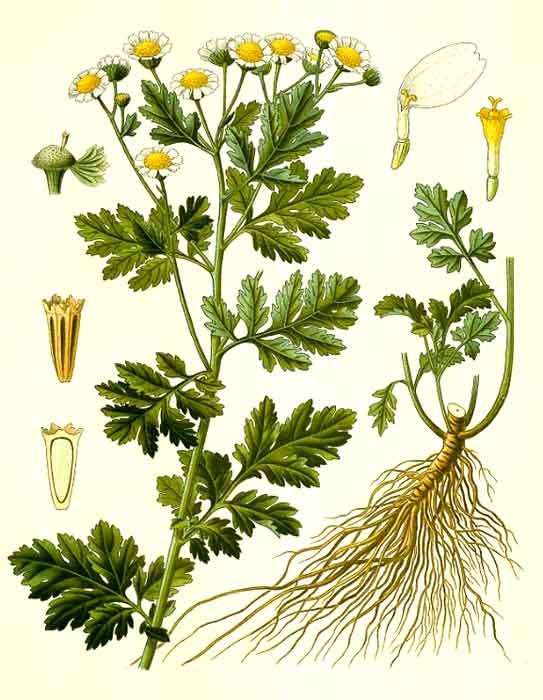Headache herbs
Headaches and migraines are symptoms of underlying problems. Persistent ones may call for a change in lifestyle, or a visit to your healthcare professional.

There are several types of headaches including tension headache, sinus headaches, migraines, cluster headaches, and headaches caused by hormonal changes. Headaches affect millions of people every day. Thank God, there are herbs and home remedies that can really make a difference.
Calming herbs help ease headache.
Infusions, herbal teas, and tinctures can relieve painful headaches. Herbal products are not only effective, they are also easy and cheap to make at home.
Use lemon balm, lavender, chamomile, passion flower, St. John's wort, valerian, wild lettuce, ginkgo biloba, or bee balm in homemade products such as teas, tinctures, and compresses. These herbs help relax and soothe both the body and mind.
Read more about making your own herbal products at home.
Use white willow bark for stopping pain.
Mild headaches can be quickly eased with herbal pain relievers like white willow bark. White willow bark contains the same ingredient as aspirin but does not cause stomach irritation.
Find more ways to treat pain with herbs and natural remedies.
Treat tension headache with aromatherapy.
Tension headaches are very common in today's society and may be due to stress, eye strain, a pinched nerve, excess caffeine, or sitting too long in a cramped position. Thank goodness tension headaches respond to a variety of calming herbs, essential oils, and massage.
Aromatherapy is especially suited for treating tension headaches. One tried and true headache treatment requires turning down the lights, sipping an herbal tea, and taking deep breaths while sniffing lavender essential oil.
Rub some lavender essential oil on the temples and back of the neck. It should bring relief within 10 minutes.
Massage is especially good for getting rid of tension headache. Concentrate on the shoulders and neck for best results. Scalp massage and reflexology are also effective natural remedies. Read more about using alternative medicines.
If you have been reading my Every Green Herb blog for a while, then you know we grow and sell a variety of herbs, but we also buy a lot, too. Try our favorite herbal suppliers for quality and value.

Treating sinus headache with herbs
Headaches due to excess mucus, congestion, and sinus problems are eased by using herbs with decongestant properties, by breathing fresh clean air, and by limiting or removing dairy products from the diet.
Did you know that drinking cow's milk and eating a lot of dairy products causes mucus buildup? Limiting dairy products in the diet can really help get rid of sinus headaches.
Peppermint, eucalyptus, horseradish, lavender, ginger, and rosemary can all help a sinus headaches. Add extra apples, fresh pineapples, cranberry juice, green salads, brown rice, cider vinegar, and honey to the diet.
These foods help thin mucus and relieve sinus headache pain.
Migraine headaches can be treated with herbs.
Migraine headaches can be caused by food intolerance and pollutants. If you suspect either of these, liver cleansing and removal of toxins can really help.
Agrimony, dandelion, and feverfew tea should be taken regularly. Avoid smoke and other air pollutants like mold and exhaust fumes.
Feverfew and migraines
Feverfew should be taken before a migraine strikes! Feverfew stops migraine headaches from starting in the first place, but may not help once the pain is underway. Feverfew is more of a preventive herb than a pain remedy.
Effects of taking feverfew are usually not noticed for several weeks. Feverfew is not an immediate treatment for a migraine headache but can ease common symptoms including nausea and sensitivity to light.
After taking feverfew for several weeks, many migraine sufferers report fewer and less intense headaches. A suitable pain reliever such as white willow is required once a headache starts.

Scientific studies on herbs and headache
Many studies have been done on herbal remedies for migraine headache. Herbs that were studied include feverfew, butterbur, curcumin, peppermint, coriander, citron, Damask rose, chamomile, and lavender. According to scientists, results were positive, but more research is needed.
Studies show that supplements including coenzyme Q10, vitamin B-12, and magnesium are also effective treatments for migraine.
What is a migraine headache?
Migraine causes much suffering throughout the world. With throbbing pain, symptoms include nausea, vomiting, photophobia (fear of light), and phonophobia (fear of sound).
Migraines are three times more common in women than in men.
The exact cause of migraine is unclear, but brain scans show that during episodes, there is an abnormal metabolism in the brain. These altered chemical reactions are associated with genetic and neurovascular components.
Migraines are associated with heart disease, stroke, asthma, epilepsy, allergies, and sleep disorders.
Migraines often come with an aura.
The aura is associated with sensory, visual, or motor disturbances. The aura may increase sensitivity to light and sound or cause flashes of light, numbness, or tingling in the face.
Aura occurs due to waves of depolarization spreading across the cortex of the brain leading to stimulation of cerebral vessels. Things like fasting, skipping meals, and stress are common triggers.
People are turning to natural remedies like vitamins and herbs because they work, they have few side effects, they are readily available, and inexpensive.
- CoQ10 helps with migraines by sustaining mitochondrial energy stores in the cells. It is also antiinflammatory.
- Curcumin works as a strong antioxidant.
- Vitamin B2 also works to maintain energy in the cells and to keep the brain healthy.
- Magnesium regulates neuronal excitability reducing migraine pain.
- Feverfew causes relaxation of vascular muscles and has powerful antiinflammatory effects. Studies show that antioxidants are very important when treating headache.
- To get lots of natural antioxidants in your diet, add colorful foods like berries and vegetables to every meal. Your brain will thank you!
Cluster headaches could be caused by food allergies.
Cluster headaches are described as two or more sudden attaches a day, usually with pain localized over the eyes or a spot on the forehead. Cluster headaches indicate a brain imbalance and sometimes occur after eating a food that one craves.
This is the “trigger” food. Avoid common trigger foods like smoked salmon, pickled fish, aged cheese, nitrates, red wine, avocados, caffeine, chocolate, yogurt, and artificial sweeteners.
Drink a vegetable blend containing celery and carrot juice, recline in a comfortable position, and apply a cold compress containing lavender essential oil over the forehead at the first sign of a cluster headache.
Sometimes a headache can indicate a more serious condition. If you have severe pain, seek professional help as soon as possible.
Headaches are often linked to the menstrual cycle and hormonal changes.
Black cohosh, catnip, and sage are very useful during these times. Exercise can also help ward off hormonal headaches.
I suffered with monthly hormonal headaches most of my teenage and adult life. Now, at age 67, it seems like headaches are a thing of the past. I haven't but one or two headaches since menopause, over ten years ago!
Often headaches are caused by constipation and digestion problems.
Peppermint, fennel, slippery elm, buckthorn bark, aloe vera, and psyllium husks are all good herbs for the stomach and intestines. To avoid headaches, keep things moving through the colon. Read more about keeping the colon healthy with herbs.

Headache from too much reading
Headache can also be caused by eye strain. When reading for long periods, take breaks and look off into the distance at least once an hour. Make sure the light is good and that you are not squinting.
If you have trouble reading, or things look blurry, get your eyes checked by a professional eye care provider. If you wear glasses or contacts, follow your healthcare professional's advice.
When using a computer or a mobile device, also take breaks. Your eyes are not meant to stare at a screen all day. Read more about herbs for the eyes.
Headache and diet
Try to eat something high in magnesium when suffering with a headache. Greens, sea food, nuts, whole grains, and molasses are examples. Vitamin C can also help.
Avoid all MSG, soft drinks, liquor, artificial sweeteners, and red meat if you suffer from headaches.
Prescription pain relievers
The best pain relievers are illegal or require a doctor's prescription. Most, including morphine and other opiates, are highly addictive and should be taken with extreme caution.
You do NOT want to get into that trap. Turn to herbal medicine and natural remedies whenever possible and you will be better off.
*Chewing fresh feverfew leaves can cause mouth sores. Feverfew can affect blood clotting rates so avoid when taking blood-thinning medications.
Avoid feverfew if you are allergic to ragweed, daisies, chamomile, chrysanthemums, or yarrow. Stop taking feverfew immediately if you experience any allergic skin reaction.
Long-term feverfew users who stop treatment suddenly may experience withdrawal symptoms including headaches, anxiety, insomnia, muscle stiffness, and joint pain. Do not use feverfew if pregnant.
Do not take willow bark with other pain killers. Seek medical attention if you have a sudden headache with high fever, double vision, confusion, numbness, or possible head injury.
Always consult with a healthcare professional before using any herbal remedy especially if pregnant, nursing, or taking other medications.
Sources:
https://pubmed.ncbi.nlm.nih.gov/32310327/
https://www.ncbi.nlm.nih.gov/pmc/articles/PMC8105190/
Blessings to you and yours!
Thanks so much for reading my blog. Jan.

*Note - the information on this website has not been evaluated by the Food and Drug Administration.
© 2005-2024 website design and content by Janice Boling